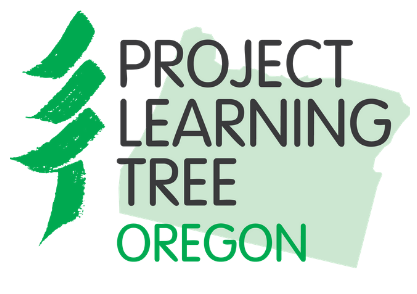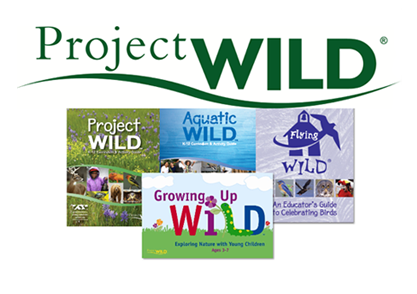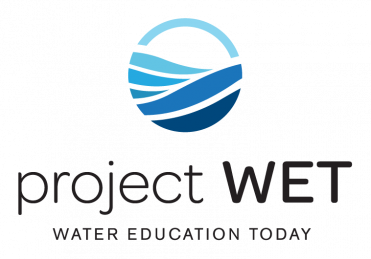The curriculum and educational materials adopted and distributed by ONREP aligns with the
- North American Association for Environmental Education (NAAEE) Environmental Education Materials: Guidelines for Excellence,
- Common Core State Standards, and the
- Next Generation Science Standards (NGSS).
We are happy to provide formal and nonformal educators with a host of materials from Project Learning Tree (PLT) & Project WILD curriculum to local Oregon-based books, posters, pamphlets, videos, virtual field trips, and other materials produced by local organizations, including the Oregon Forest Resources Institute, Oregon State University Extension Service, Oregon Department of Fish and Wildlife, and others.
What's New
ONREP is now Oregon's Project WET host!

Project WET is an international environmental education program, that advances water education to understand global challenges and inspire local solutions.
Curriculum
The cornerstone of ONREP professional development are three nationally recognized environmental education curricula: Project Learning Tree (PLT), Project WILD, Project WET and BEETLES (Better Environmental Education, Teaching, Learning & Expertise Sharing). These curricula explore the interrelationship of forests, wildlife, outdoor education and their connection to our lives, through field-based, hands-on activities that develop critical thinking skills.

Project Learning Tree (PLT) is an award-winning environmental education program designed for teachers and other educators, parents, and community leaders working with youth from preschool through grade 12. PLT uses the forest as a “window on the world” to advance environmental literacy and promote stewardship through excellence in environmental education, professional development, and curriculum resources.

Project WILD, Aquatic WILD, and Flying WILD provide wildlife-based conservation and environmental education that fosters responsible actions toward wildlife and related natural resources. All curriculum materials are backed by sound educational practices and theory, and represent the work of many professionals within the fields of education and natural resource management from across the country.

Project WET's mission is to advance water education to understand global challenges and inspire local actions. Their resources for educators include award-winning education books, guides, maps, posters, and downloadable resources. Resources meet educational standards and are designed to complement existing curricula.
Resources
This website has a list of the 100 best nature books, identified by CNN, Forbes, and Inc-Book Authority. The list has a rating, a summary of the book, reviews, and where you can purchase the book.
List of 19 podcasts that you can listen to with children, all of the podcasts are science related. Each listing has a description of the podcast.
Project Learning Tree created a list of Latinx and Hispanic-focused experiences in the outdoors. In this list, the books will explore concepts that may be familiar to educators of preschool to elementary-aged students, as well as tell stories that explore our relationship with nature.
This website has a list of 50 nature books for children. Each book has a link that will lead to where the book can be purchased or accessed.
Access Recreation, a Portland-based organization compiles detailed trail information for hikers of all abilities and experience levels. The trail reviews don't intend to identify trails which are considered ADA accessible, but rather to share information about select trails of interest, as they are, so people with disabilities can make their own determination about whether to try a trail or not.
This PDF divides Oregon into separate watershed districts. Each district lists several locations that rate restrooms, drinking water, fishing, hunting, camping, picnic sites, boat access, interpretive sites, views, and parking based on accessibility. Categories include ADA accessible, usable, available, and facilities nearby.
Accessible Adventures in the Pacific Northwest is a series of videos produced by the US Forest Service to make the outdoors accessible to all through videos and also test how accessible each of the sites are for people with physical limitations. It explores trails in Washington and Oregon.
The goals of the African American Outdoor Association are to conduct active outdoor excursions that encourage African Americans to explore the natural environment. Promote healthy living by encouraging families to shift to physically active lifestyles. Increase knowledge and appreciation of the beauty and natural resources of the Pacific Northwest, and build community around active living.
Summary page of facts about Bald Eagles and resource links to learn more about this species of bird.
The Aquatic WILD K-12 Curriculum & Activity Guide is geared toward formal and nonformal educators with many resources including WILD Work, in step with STEM, field investigations, and more!
The Childrens Forest of Central Oregon is a network of 25+ public, private, and non-profit organizations working to connect children and families to nature through learning, exploration, and play. They have a strong focus on equity and inclusion, working to connect underserved audiences to impactful experiences in nature.
Confluence connects the history, living cultures, and ecology of the Columbia River system through Indigenous voices. The library contains stories, audio recordings, articles, videos, and image galleries of Indigenous voices and experiences.
Creciendo WILD is an early childhood guide focused on nature and wildlife. It fosters children’s curiosity about the natural world while developing strong academic skills. The activities are entirely in Spanish.
Free online course that supports outdoor educators in engaging with culturally responsive incorporation of Indigenous studies concepts into outdoor education curriculum and programming. While outdoor school programs in Oregon serve fifth and sixth grade students, course content applies broadly to all outdoor and experiential education.
The Discover the Forest campaign, a public service campaign created by the Ad Council in partnership with the U.S. Forest Service, encourages parents of tweens to experience the outdoors with their family to strengthen their connection with nature and each other. By exploring local parks and forests, parents and caregivers make the forest part of their famil (y's story, and introduce their children to an environment where imagination thrives and memories are made. Includes virtual field trips, activities, and resources.
Environment for the Americas grew out of the success of International Migratory Bird Day, which celebrates migratory birds throughout Canada, the United States, Central and South America, and the Caribbean. The website offers virtual field trips, resource directly, training, outreach to LatinX Communities, and bird IQ activities and quizzes.
Facilitator Equity Survey Results 2024
In the spring of 2024, we asked for ONREP facilitator input to understand perceptions of equity within ONREP and identify opportunities for program improvement. Data was collected from 34 facilitators via a voluntary online confidential survey as well as a virtual live listening session. This report is a summary of the results.
The “Gikinoo’wizhiwe Onji Waaban” (Guiding for Tomorrow) or “G-WOW” Initiative is a unique educational methodology to increase awareness of how climate change is affecting the environment, people, cultures, and economies; and promoting action to address it .
The Qapqápnim Wéele / Grande Ronde Community Science Project is a participant driven science research program that engages youth in monitoring the Qapqápnim Wéele / Grande Ronde watershed and integrates Indigenous ways of knowing with western science practices.
IEN is an alliance of Indigenous Peoples whose Shared Mission is to Protect the Sacredness of Earth Mother from contamination & exploitation by Respecting and Adhering to Indigenous Knowledge and Natural Law.
The Indigenous STEAM Collaborative is a group of researchers and educators that engages in cognitive and community co-design research to advance general knowledge, develop pedagogical approaches for engaging youth in land- and water-based learning, and provide learning materials to Indigenous families. They apply what they learn to the development of learning tools for Indigenous youth and families, through collaboration with community organizations, educators, and families.
This website is a wonderful free resource for all educators who want to incorporate Nature Journaling into their adventures outside. Nature Stewardship through science, education, and art.
Justice Outside’s programs provide both established and aspiring outdoor professionals with the skills necessary to transform the environmental field into a more equitable and culturally relevant sector. Programs include training and support, cultural relevancy workshops for decision-makers at outdoor-focused organizations, Rising Leaders Fellowship, and Outdoor Educators Institute. Additionally, they offer a grant program prioritizing funding for programs led by Black, Indigenous, and People of Color.
Keep Oregon Green has a kids corner with nature based activities. They also offer a ranger program to help teach kids about the value of Oregon's forests.
Latino Outdoors is a Latinx-led organization working to create a national community of leaders in conservation and outdoor education. They are focused on expanding and amplifying the Latinx experience in the outdoors; providing greater leadership, mentorship, and professional opportunities while serving as a platform for sharing cultural connections and narratives that are often overlooked by the traditional outdoor movement.
Latino Verde is an organization that provides environmental storytelling from a Latinx perspective. This organization also provides guidance for young Latinx students on working in the environmental sciences, as well as providing resources for Spanish speakers interested in conservation and sustainability.
This illustrated collection of essays addresses topics related to Oregon's forests, including wildlife, forestry and tree biology. The one-page essays were written by a team of natural resources specialists and then reviewed by teachers for content and readability and scientists for accuracy. Each essay includes reading comprehension questions.
Collection of forest education resources for K-2, including field programs, teacher professional development, publications, and curriculum.
Talk About Trees is an interactive, science-based program for pre-school through eighth grade students. Programs are presented by experienced facilitators and offered free to classrooms throughout Oregon.
Mystery Science offers lesson plans specifically for distance learning for grades K-5. The plans have exit tickets, digital handouts and assigments, and it can be easily integrated into Google Classroom.
National Council for Geographic Education (NCGE) outlines the National Geography Standards designed to ensure students master three key geography skills: factual knowledge, mental maps and tools, and ways of thinking. NCGE aims for all students to achieve proficiency in each standard by the time they graduate from high school.
Collection of free virtual tours of U.S. National parks that are interactive and dynamic. Powered by Google Earth.
The National Museum of the American Indians provides educational materials, virtual student programs, and teacher training that incorporate Native narratives, more comprehensive histories, and accurate information to enlighten and inform teaching and learning about Native Americans.
The Native Plants and Foods Portal provides 5 educational toolkits that explore native and naturalized plants and foods from the Pacific Northwest region. This resource provides local Indigenous knowledge about the plants, and helps emphasize the relationships between you and plants, the community, and local areas.
This website is a Spanish translation of the Natural Resources Defense Council (NRDC). The NRDC provides recent news and information regarding the environmental climate crisis, environmental justice, and nature and wildlife.
Accessible Nature provides a list of trails that are wheelchair accessible or are very easy for walking. Their goal is to make it easier for everyone to enjoy nature. Each trail states whether it is wheelchair accessible, if it has audio interpretive information or rope guides, and if the trail has any difficult steps including rocks or roots.
ODE collection of resources to support edcuators, including teacher licensure, family engagement, educational standards, Oregon mentoring project, and teaching materials.
The goal of the Oregon Environmental Literacy Program is to support tea
TrailLink provides information such as trail descriptions, maps, photos, and reviews for all the wheelchair accessible trails in Oregon.
Outdoor Afro’s programs are designed to reconnect Black people and Black communities to nature year-round. These original programs amplify Black joy and healing in the outdoors. With volunteer leaders, local participants, and dedicated supporters, the programming reinforces the mission to celebrate and inspire Black connections and leadership in nature.
Outdoor Asian's vision is to create a diverse and inclusive community of Asian and Pacific Islanders in the outdoors.
Pacific Education Institue offers resources and support for educators to equitably advance scientific literacy by promoting outdoor, locally relevant, integrated, career connected, real-world science.
A collection of trainings, pamphlets, videos, and worksheets to provide a foundation for social and climate justice education.
Try these activity ideas from Project Learning Tree to connect the children in your life to the outdoors and nature.
Project Learning Tree's Energy & Society Kit offers K-8 students opportunities to learn about their relationship with energy and helps develop their critical thinking skills to make decisions about their personal energy use. In addition to hands-on activities, this curriculum integrates music and dance to enhance the study of energy issues.
PLT’s new Explore Your Environment: K-8 Activity Guide includes 50 hands-on, multidisciplinary activities to connect children to nature and increase young people's awareness and knowledge about their environment. Activities integrate teaching about the environment into a multitude of subjects using hands-on classroom studies and outdoor field investigations. The guide is user-friendly, and works in classrooms and nonformal settings, in urban, suburban, and rural areas.
Project Learning Tree's GreenSchools for Early Childhood program is designed to meet the needs of early childhood educators and younger learners. It is designed to teach young children about their environment and how they can make a difference, while developing their skills in language, mathematics, science, and more. PLT's GreenSchools for Early Childhood includes an Educator Guide and five Investigations.
Project Learning Tree offers GreenWorks! grants to schools and youth organizations for environmental service-learning projects that link classroom learning to the real world. Students implement an action project they help design to green their school or to improve an aspect of their neighborhood's environment.
Overview of all Project Learning Tree guides and resources for elementary and middle school educators.
Project Learning Tree's monthly e-newsletter is free for all educators and includes free tools and resources, new lesson plans, professional development and grant opportunities, and tips from educators for teaching about the environment.
Treemendous Science is an e-unit for grades K-2. Students will explore, experience, observe, and collect tree data to develop understandings about how trees grow, the roles trees play in ecological systems, and the ways in which trees and humans interact.
Project WILD's mission is to provide wildlife-based conservation and preK-12 environmental education that fosters responsible actions toward wildlife and related natural resources. All curriculum materials are backed by sound educational practices and theory, and represent the work of many professionals within the fields of education and natural resource management from across the country.
Growing Up WILD offers a list of nonfiction and fiction books for kids. Includes a list of where to purchase the books, as well as some early childhood organizations.
Project WILD is an interdisciplinary conservation and environmental education program that focuses on wildlife and habitat. This curriculum guide for Pre-K through 12th grade education, includes field investigation activities, in step with STEM activity extensions, WILD work career connections, and outdoor component.
Using wildlife as an integrating context can help make teaching about climate change more concrete. Use best practices in climate change education and gain access to quality, science-based, wildlife management principles that address this complicated issue. Your students will be outdoors, interacting with one another and the community, and learning from trusted sources.
Resource that details how Project WILD activities in the respective curriculum and activity guides correlate to NGSS, Common Core State Standards, Head Start Early Learning Framework, Scout Badges, and many more.
Whether you are home-schooling or looking for resources to keep your kids learning all year, Project WILD has resources for you and your learners, includes abbreviated activities PreK-12 and a children's book list along with other resources.
Project WILD resources all about learning about bats, includes, curriculum, online activities, videos, and many other resources.
As universities, colleges, and schools move to learning online in the wake of the coronavirus spread, many educators are interested in how to conduct WILD activities remotely. Project WILD has adapted a number of their activities to be online, includes ideas and resources to guide students through WILD activities at their own location.
Queer Mountaineers provides community, events, resources, and a safe space for outdoor enthusiasts of all backgrounds, genders, and sexualities. This organization provides trainings for the future outdoor leaders and strives to diversify the outdoor industry.
SRI uplifts and strengthens communities by connecting inner city youth and veterans to the outdoors, harnessing incredible opportunities and powerful experiences that forge strong connections between youth and veterans, their communities, and the natural world.
Statewide Equity Survey Results 2024
In the Fall 2024, we conducted an online Equity Survey using our online survey collection platform to gather feedback from educators and partners on our progress, areas for improvement, and unmet needs. A total of 278 individuals responded. This report provides a summary of what they shared, what we learned, and the responsive actions ONREP is taking now and in the future.
The goal of this Oregon Environmental Literacy Program (OELP) publication is to encourage and support educators who use or want to use the outdoors as an integral part of the teaching and learning experience for their students.
Explore fun games, contests, and activities for parents and kids to do together.
The Oregon Zoo's goal is to insipre their vistors to creatd a better future for wildlife. In addition to in-person visits, they offer at-home activities and virtual encounters.
Disabled Hikers is a Disabled-led organization that provides information and resources that work towards building disability community in the outdoors. They advocate for justice, access, and inclusion within the outdoors.
This toolkit created by the Northwest Portland Area Indian Health Board and partner organizations is intended to be used as a resource and a guide for discussion in American Indian and Alaska Native communities. It addresses the historical trauma resulting from Indian boarding schools in the United States. Sections include discussion guide, social media, the past, the present, the future, highlights and calls to action, and experiential therapies.
The Collaborative, Academic, Social, and Emotional Learning (CASEL) provides a free course about social and emotional learning and how it can connect to you and the students and/or children in your life. This course is provided in both Spanish and English.
Vive NW aims to diversify the outdoors by connecting local LatinX and all communities to the outdoors and the extensive adventures offered by this landscape. Our objective is to provide valuable information, outdoor experiences and opportunities that will empower all communities.
Wild Diversity helps to create a personal connection to the outdoors for Black, Indigenous, all People of Color (BIPOC) & the LGBTQ+ communities, through outdoor adventures and education. Wild Diversity's Youth Ecology Summer Days is our program providing BIPOC youth in grades 6-8th with holistic connections to ecology, conservation and outdoor resilience.